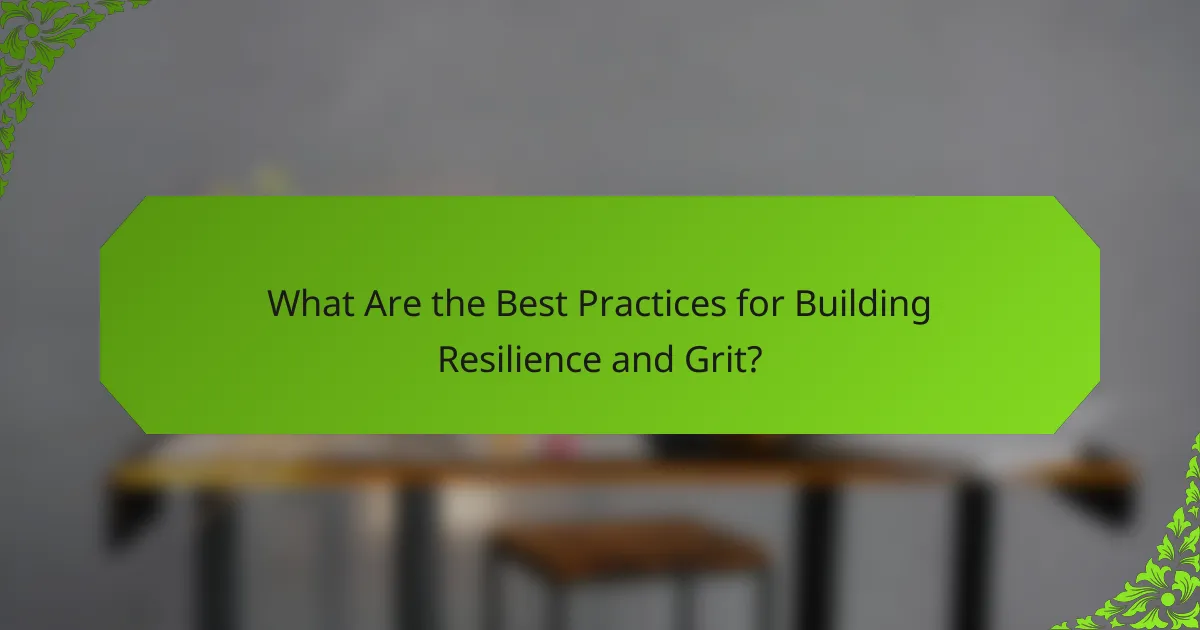Mental toughness is crucial for amateur athletes striving to improve performance under pressure. This article explores essential practices for developing resilience and grit, including goal setting, mindfulness, and visualization techniques. It highlights the importance of intrinsic motivation and adaptability in building mental toughness. Additionally, it addresses common pitfalls in mental preparation that can hinder athletic success.

What is Mental Toughness in Sports?
Mental toughness in sports refers to an athlete’s ability to maintain focus, resilience, and determination under pressure. Developing mental toughness involves practices that enhance resilience and grit, essential for amateur athletes. Key practices include setting clear goals, embracing challenges, maintaining a positive mindset, and practicing visualization techniques. Research shows that athletes with high mental toughness perform better, particularly in high-stress situations. For amateur athletes, consistent training in these areas can significantly improve performance and overall well-being.
How does Mental Toughness Impact Amateur Athletes?
Mental toughness significantly enhances amateur athletes’ performance by fostering resilience and grit. This psychological strength allows athletes to overcome challenges, maintain focus, and push through adversity. Research indicates that mentally tough athletes exhibit higher levels of perseverance and goal commitment, leading to improved outcomes in training and competition. Furthermore, developing mental toughness can reduce anxiety and increase self-confidence, essential attributes for success in sports. Incorporating practices such as visualization, positive self-talk, and goal-setting are effective strategies for building this crucial characteristic.
What are the Key Components of Resilience?
Resilience in sports involves adaptability, mental strength, and perseverance. Key components include self-awareness, emotional regulation, goal-setting, and social support. Self-awareness helps athletes recognize their strengths and weaknesses. Emotional regulation enables effective stress management. Goal-setting provides direction and motivation. Social support fosters resilience through encouragement and shared experiences.
How does Emotional Regulation Contribute to Resilience?
Emotional regulation significantly enhances resilience by enabling athletes to manage stress and maintain focus. By effectively controlling emotions, athletes can recover from setbacks and maintain motivation during challenges. This skill fosters mental toughness, allowing for improved performance under pressure. Research shows that athletes with strong emotional regulation are more likely to demonstrate grit, leading to sustained effort and persistence in their sports endeavors.
What Role Does Self-Confidence Play in Grit?
Self-confidence significantly enhances grit by empowering athletes to persist through challenges. When athletes believe in their abilities, they are more likely to push through adversity, maintaining focus on long-term goals. Research indicates that self-confidence correlates with resilience, allowing athletes to recover from setbacks more effectively. This unique attribute of self-confidence fosters a growth mindset, essential for developing mental toughness in sports. As a result, athletes with high self-confidence are better equipped to demonstrate grit, ultimately improving their performance and resilience.
What are the Benefits of Developing Grit?
Developing grit enhances resilience, enabling athletes to overcome challenges and maintain focus. It fosters perseverance, leading to improved performance and goal attainment. Grit also promotes mental toughness, allowing athletes to handle pressure effectively. Additionally, it builds confidence, encouraging a positive mindset that contributes to long-term success.

What Universal Practices Enhance Resilience?
Practices that enhance resilience include goal setting, mindfulness, and positive self-talk. These techniques foster mental toughness and grit in amateur athletes.
Goal setting provides clear objectives, promoting focus and motivation. Mindfulness enhances awareness and emotional regulation during stress. Positive self-talk builds confidence and combats negative thoughts.
Incorporating these practices leads to improved performance and greater resilience in challenging situations.
How Can Goal Setting Foster Mental Toughness?
Goal setting significantly enhances mental toughness by providing clear objectives and motivation. It fosters resilience and grit, essential traits for amateur athletes. Specific goals encourage focus and determination, enabling athletes to overcome challenges. Research shows that goal-setting leads to higher performance levels and increased persistence in the face of adversity. By setting measurable and achievable targets, athletes can track their progress, reinforcing their commitment and mental fortitude.
What Role Does Visualization Play in Building Grit?
Visualization significantly enhances grit by enabling athletes to mentally rehearse challenges and visualize success. This practice fosters resilience, allowing athletes to better cope with setbacks. Research shows that mental imagery can improve performance by up to 20%. Regular visualization strengthens the neural pathways associated with skills, making them more accessible during competition. By integrating visualization into training, amateur athletes can develop a unique attribute of mental toughness essential for enduring the rigors of sports.
How Does Regular Reflection Improve Resilience?
Regular reflection enhances resilience by fostering self-awareness and enabling athletes to learn from experiences. This practice allows amateur athletes to identify strengths and weaknesses, leading to improved mental toughness. Engaging in regular reflection helps build grit, as athletes can adapt strategies based on past performances. Studies show that reflective practices can increase resilience by up to 30%, providing a significant edge in competitive sports.

What Unique Strategies Can Amateur Athletes Use?
Amateur athletes can develop mental toughness through unique strategies like visualization, goal setting, and mindfulness. Visualization helps athletes mentally rehearse performance scenarios, enhancing confidence. Goal setting provides clear objectives, fostering motivation and focus. Mindfulness practices improve emotional regulation and awareness, enabling athletes to handle pressure effectively. These strategies build resilience and grit, essential for overcoming challenges in sports.
How Can Team Dynamics Strengthen Grit?
Team dynamics can significantly enhance grit by fostering a supportive environment. Effective collaboration among teammates builds resilience, as athletes share challenges and motivate each other. This collective effort cultivates a mindset focused on perseverance and overcoming obstacles. Studies show that athletes in cohesive teams exhibit higher levels of mental toughness, leading to improved performance under pressure. Additionally, positive reinforcement from teammates can reinforce individual grit, making it a unique attribute in sports.
What Innovative Training Techniques Promote Resilience?
Innovative training techniques that promote resilience include mental conditioning, goal setting, and mindfulness practices. These methods enhance mental toughness by fostering grit and adaptability in amateur athletes.
Mental conditioning exercises, such as visualization and positive self-talk, help athletes prepare for challenges. Goal setting provides clear objectives, encouraging perseverance through setbacks. Mindfulness practices, like meditation, improve focus and stress management, crucial for maintaining resilience during competition.
Research indicates that athletes who engage in these techniques show improved performance and greater emotional stability. For example, a study found that athletes using visualization techniques reported a 20% increase in their ability to cope with pressure.
Integrating these training techniques into regular practice equips amateur athletes with essential skills to navigate the ups and downs of sports, ultimately enhancing their overall mental toughness.

What Rare Attributes Contribute to Exceptional Grit?
Rare attributes that contribute to exceptional grit include intrinsic motivation, adaptability, and perseverance. Intrinsic motivation drives athletes to pursue goals for personal satisfaction, enhancing commitment. Adaptability allows athletes to adjust strategies in response to challenges, fostering resilience. Perseverance is the sustained effort despite obstacles, crucial for long-term success. These attributes are less common but significantly impact an athlete’s mental toughness and overall performance.
How Does Adaptability Influence Long-Term Success?
Adaptability significantly enhances long-term success in sports by fostering resilience and grit. Athletes who embrace change can better cope with challenges and setbacks. This mental flexibility allows them to adjust strategies, maintain motivation, and stay focused on goals. Research indicates that adaptable athletes often demonstrate superior performance under pressure, leading to sustained achievement over time.
What Role Does a Growth Mindset Play in Overcoming Challenges?
A growth mindset enhances resilience, enabling amateur athletes to view challenges as opportunities for development. This perspective fosters mental toughness, encouraging persistence despite setbacks. Research indicates that athletes with a growth mindset are more likely to embrace difficult training, leading to improved performance. By focusing on effort and learning, they cultivate grit, which is essential for overcoming obstacles in sports.
How Can Athletes Cultivate a Sense of Purpose?
Athletes can cultivate a sense of purpose by setting clear, meaningful goals that align with their values. This focus enhances mental toughness and resilience. Engaging in reflective practices, such as journaling or meditation, helps athletes connect with their motivations. Additionally, surrounding themselves with supportive teammates fosters a sense of belonging and shared purpose. Regularly revisiting these goals and reflecting on progress strengthens commitment and grit, essential for overcoming challenges in sports.

What Common Mistakes Should Amateur Athletes Avoid?
Amateur athletes should avoid underestimating the importance of mental preparation. Failing to develop resilience can lead to burnout and decreased performance. Common mistakes include neglecting goal setting, ignoring feedback, and overemphasizing physical training while underpreparing mentally. Building mental toughness involves consistent practice of visualization, positive self-talk, and stress management techniques.
How Can Overtraining Affect Mental Toughness?
Overtraining can significantly diminish mental toughness by increasing stress and anxiety levels. This decline in psychological resilience often leads to decreased motivation and focus, hindering athletic performance. Studies indicate that overtraining syndrome can result in mood disturbances, fatigue, and a negative mindset, which are detrimental to an athlete’s grit and perseverance. As a result, maintaining a balanced training regimen is essential for fostering mental toughness in sports.
What Are the Pitfalls of Negative Self-Talk?
Negative self-talk can undermine mental toughness and hinder performance in sports. It fosters self-doubt, reduces confidence, and increases anxiety. Amateur athletes may experience decreased motivation and focus due to persistent negative thoughts. Recognizing and reframing these thoughts is crucial for developing resilience and grit. Implementing positive affirmations and constructive self-talk strategies can transform mindset, enhancing overall athletic performance.
How Can Athletes Recognize and Combat Burnout?
Athletes can recognize burnout through signs like chronic fatigue, decreased performance, and lack of motivation. To combat burnout, they should practice resilience techniques such as setting realistic goals, maintaining a balanced routine, and seeking support from coaches or peers. Engaging in mindfulness and relaxation exercises can also enhance mental toughness, helping athletes manage stress effectively. Regular self-assessment of mental well-being is crucial for early detection and intervention.

What Are the Best Practices for Building Resilience and Grit?
Building resilience and grit involves practicing mental toughness through specific strategies. Focus on setting achievable goals, maintaining a positive mindset, and embracing challenges.
1. Set SMART goals: Specific, Measurable, Achievable, Relevant, Time-bound objectives enhance focus and motivation.
2. Cultivate a growth mindset: View failures as learning opportunities to foster resilience.
3. Practice visualization: Mentally rehearse success to build confidence and reduce anxiety.
4. Develop a support network: Surround yourself with encouraging peers who share similar goals.
5. Embrace discomfort: Regularly push your limits to strengthen mental fortitude.
How Can Daily Routines Support Mental Toughness?
Daily routines can significantly enhance mental toughness by fostering discipline and consistency. Establishing a structured schedule helps amateur athletes develop resilience through repeated practice and goal-setting.
Incorporating specific activities into daily routines, such as mindfulness exercises and physical training, builds a strong mental foundation. Research indicates that athletes who engage in consistent routines exhibit higher levels of grit and perseverance.
Furthermore, tracking progress within these routines allows athletes to identify strengths and areas for improvement, reinforcing their mental fortitude. This self-awareness is a unique attribute that contributes to ongoing development in sports.
Ultimately, daily routines serve as a powerful tool for cultivating mental toughness, equipping athletes with the resilience needed to face challenges in their sporting endeavors.
What Are Effective Techniques for Stress Management?
Effective techniques for stress management in sports include mental visualization, mindfulness, and goal-setting. Mental visualization helps athletes imagine success, enhancing confidence and focus. Mindfulness practices reduce anxiety by promoting present-moment awareness, improving emotional regulation. Goal-setting establishes clear objectives, providing motivation and a sense of accomplishment. Incorporating these techniques fosters resilience and grit, essential for amateur athletes to overcome challenges.
How Can Amateur Athletes Create a Support Network?
Amateur athletes can create a support network by connecting with peers, coaches, and mentors. Building relationships with fellow athletes fosters camaraderie and shared experiences. Utilizing social media and local sports clubs enhances visibility and networking opportunities. Engaging in group training sessions can strengthen bonds and accountability. Establishing communication channels promotes ongoing encouragement and advice.



